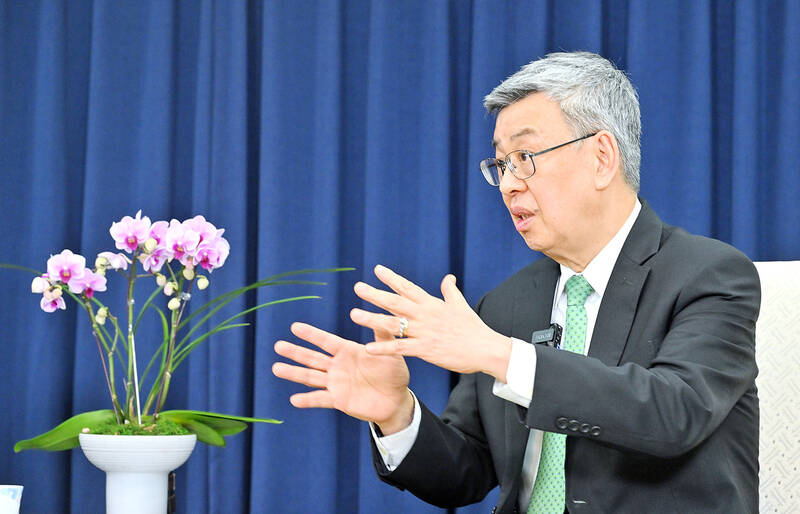China’s decision to end tariff reduction on some Taiwanese imports under the Economic Cooperation Framework Agreement (ECFA) early harvest lists is of a political rather than an economic nature, Premier Chen Chien-jen (陳建仁) said, adding that the government has been communicating with the industries most affected.
The Chinese Customs Tariff Commission on Dec. 21 last year announced it would terminate the reduced tariffs on imports of 12 Taiwanese petrochemical products, including propylene and paraxylene, starting on Monday last week.
China’s Taiwan Affairs Office spokeswoman Zhu Fenglian (朱鳳蓮) at the time said that Beijing is hopeful that cross-strait relations could “return to the right track of peaceful development,” and that negotiations to resolve trade disputes could begin “immediately” on the basis of the so-called “1992 consensus.”

Photo: Liu Hsin-de, Taipei Times
The “1992 consensus” refers to a tacit understanding between the Chinese Nationalist Party (KMT) and the Chinese Communist Party that both sides of the Taiwan Strait acknowledge that there is “one China,” with each side having its own interpretation of what “China” means.
In an interview with the Liberty Times (the sister newspaper of the Taipei Times) on Friday, Chen was asked about the government’s contingency in the event that Beijing further terminates the ECFA or some of the early harvest lists before the upcoming presidential and legislative elections.
In response, Chen said that before last month’s announcement, China already launched a unilateral probe into Taiwan’s restrictions on Chinese imports earlier in the year. So, the government has increased alertness and the Ministry of Economic Affairs has begun making an inventory of the industries that might be affected, he said.
The ministry has also communicated with businesses in the affected industries, mainly textile, petrochemical, machinery companies, he said, adding that the actual amount earned from exported items with tariff cuts under the ECFA has been decreasing.
Chen said the announcement was a decision that was not made through the ECFA negotiation mechanism, and that trade disputes could be handled through the WTO, of which both countries are members.
Facing China’s unilateral tariff move, the premier said the government must help the textile, petrochemical and machinery industries to diversify their export market destinations and upgrade their products to reduce reliance on the ECFA.
Rather then Beijing’s claims that Taiwan is facing a choice between “war and peace” and “prosperity and decline” in the upcoming election, it is a choice between “democracy and authoritarianism” and “freedom or autocracy,” Chen said.
If Taiwanese choose democracy and freedom, then Taiwan would have peace and prosperity, but if they choose authoritarianism and autocracy, it would lead to war and economic decline, he said.
Chen said Taiwan has good trade communications with the rest of the world, such as the US-Taiwan Initiative on 21st-Century Trade First Agreement Implementation Act signed last year, and that Taiwan is also signing trade-related deals with Canada and the UK, showing that Taiwan can comply with international high-standards trade rules.
Therefore, hopefully China would also trade with Taiwan under high-standard rules, rather than politicizing trade and using economic threats against Taiwan, he added.

Chinese Nationalist Party (KMT) Chairman Eric Chu (朱立倫), spokeswoman Yang Chih-yu (楊智伃) and Legislator Hsieh Lung-chieh (謝龍介) would be summoned by police for questioning for leading an illegal assembly on Thursday evening last week, Minister of the Interior Liu Shyh-fang (劉世芳) said today. The three KMT officials led an assembly outside the Taipei City Prosecutors’ Office, a restricted area where public assembly is not allowed, protesting the questioning of several KMT staff and searches of KMT headquarters and offices in a recall petition forgery case. Chu, Yang and Hsieh are all suspected of contravening the Assembly and Parade Act (集會遊行法) by holding

PRAISE: Japanese visitor Takashi Kubota said the Taiwanese temple architecture images showcased in the AI Art Gallery were the most impressive displays he saw Taiwan does not have an official pavilion at the World Expo in Osaka, Japan, because of its diplomatic predicament, but the government-backed Tech World pavilion is drawing interest with its unique recreations of works by Taiwanese artists. The pavilion features an artificial intelligence (AI)-based art gallery showcasing works of famous Taiwanese artists from the Japanese colonial period using innovative technologies. Among its main simulated displays are Eastern gouache paintings by Chen Chin (陳進), Lin Yu-shan (林玉山) and Kuo Hsueh-hu (郭雪湖), who were the three young Taiwanese painters selected for the East Asian Painting exhibition in 1927. Gouache is a water-based

Taiwan would welcome the return of Honduras as a diplomatic ally if its next president decides to make such a move, Minister of Foreign Affairs Lin Chia-lung (林佳龍) said yesterday. “Of course, we would welcome Honduras if they want to restore diplomatic ties with Taiwan after their elections,” Lin said at a meeting of the legislature’s Foreign Affairs and National Defense Committee, when asked to comment on statements made by two of the three Honduran presidential candidates during the presidential campaign in the Central American country. Taiwan is paying close attention to the region as a whole in the wake of a

OFF-TARGET: More than 30,000 participants were expected to take part in the Games next month, but only 6,550 foreign and 19,400 Taiwanese athletes have registered Taipei city councilors yesterday blasted the organizers of next month’s World Masters Games over sudden timetable and venue changes, which they said have caused thousands of participants to back out of the international sporting event, among other organizational issues. They also cited visa delays and political interference by China as reasons many foreign athletes are requesting refunds for the event, to be held from May 17 to 30. Jointly organized by the Taipei and New Taipei City governments, the games have been rocked by numerous controversies since preparations began in 2020. Taipei City Councilor Lin Yen-feng (林延鳳) said yesterday that new measures by